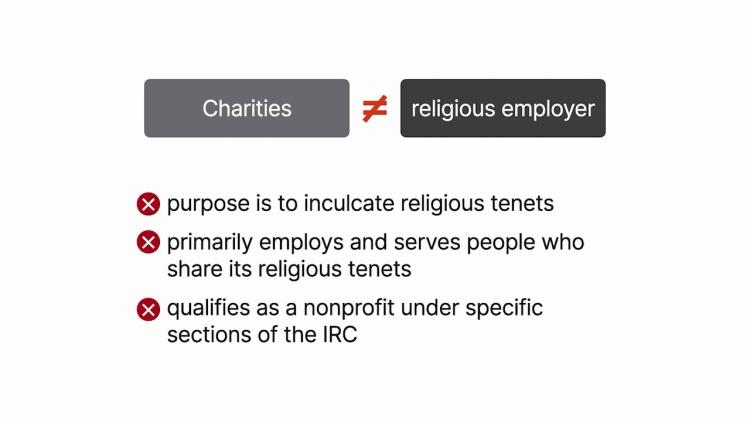Catholic Charities of Sacramento, Inc. v. Superior Court
California Supreme Court
85 P.3d 67 (2004)
- Written by Craig Conway, LLM
Facts
The California legislature enacted the Women’s Contraception Equity Act (WCEA) to improve access to prescription contraceptives. The WCEA did not require any employer to offer coverage for prescription drugs, but if an employer chose to provide such coverage, that employer was required to cover the costs of prescription contraceptives as well. The WCEA allowed a religious employer to request an exemption from providing prescription contraceptives that were contrary to the employer’s religious beliefs. Catholic Charities of Sacramento, Inc. (CCS) (plaintiff), a non-profit entity that serviced the needs of the poor, provided health insurance, including drug coverage, to its full-time employees, most of whom were not members of the Catholic Church (the Church). However, CCS did not want to offer insurance for prescription contraceptives, which were against the religious beliefs of the Church. Additionally, CCS did not meet the WCEA’s definition of a religious employer and could not qualify for an exemption. CCS filed suit against the State of California, seeking a declaratory judgment that the WCEA was unconstitutional under the Establishment and Free Exercise Clauses of the federal and state constitutions. The superior court denied CCS’s motion for a preliminary injunction. CCS appealed the decision by a petition for writ of mandate, which the court of appeal denied. The California Supreme Court granted review of the court of appeal’s decision.
Rule of Law
Issue
Holding and Reasoning (Werdegar, J.)
What to do next…
Here's why 899,000 law students have relied on our case briefs:
- Written by law professors and practitioners, not other law students. 47,000 briefs, keyed to 994 casebooks. Top-notch customer support.
- The right amount of information, includes the facts, issues, rule of law, holding and reasoning, and any concurrences and dissents.
- Access in your classes, works on your mobile and tablet. Massive library of related video lessons and high quality multiple-choice questions.
- Easy to use, uniform format for every case brief. Written in plain English, not in legalese. Our briefs summarize and simplify; they don’t just repeat the court’s language.





